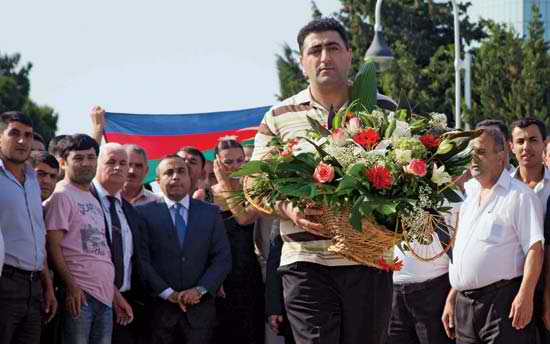LOG IN. UPLOAD PICTURES.
The Philippines has Zambo Mart to help propagate the Chavacano Language.
Azerbaijan in 2012
Azerbaijan in 2012
Area: 86,600 sq km (33,436 sq mi), including the 5,500-sq-km (2,100-sq-mi) exclave of Naxcivan and the 11,400-sq-km (4,400-sq-mi) disputed area (with Armenia) comprising the Nagorno-Karabakh region and surrounding territory
Population (2012 est.): 9,284,000
Capital: Baku
Head of state and government: President Ilham Aliyev, assisted by Prime Minister Artur Rasizade
- Upon his release from a Hungarian prison, where he had been serving a life sentence for murder, Azerbaijani army officer Ramil Safarov carries flowers to a national memorial in Baku, Aug. 31, 2012. The release and subsequent pardon of Safarov by the Azerbaijani government drew widespread criticism.
Twenty-six countries took part when in May 2012 Azerbaijan hosted the Eurovision song contest. Armenia refused to participate. Human rights defenders seized the opportunity to protest against alleged abuses by the Azerbaijani authorities, and dozens of antigovernment protesters were arrested in Baku on the eve of the final.
Azerbaijan’s economy performed relatively well during the year, with GDP projected to grow by just under 4%. Growth remained largely dependent on world energy prices. The IMF warned, however, that the economy’s reliance on oil and gas exports, as well as its slowness to diversify into other areas of production, would render it vulnerable in the case of a fall in the global demand for energy. Bribery and corruption were ongoing problems.
Tensions between Azerbaijan and Armenia over the disputed region of Nagorno-Karabakh remained high throughout the year. The summer saw the deaths of at least 10 Azerbaijani and Armenian soldiers in skirmishes on both sides of the shared border between Azerbaijan and Armenia and around Nagorno-Karabakh itself. Armenia reacted furiously when, at the end of August, Azerbaijani Pres. Ilham Aliyev pardoned Ramil Safarov, an Azerbaijani military officer who had been sentenced to life in prison in Hungary for the 2004 murder of an Armenian officer. Safarov not only was pardoned as soon as he returned from Hungary to Azerbaijan but also was promoted to the rank of major and presented with a free apartment. Hungary condemned his release and claimed to have been misled by the Azerbaijani authorities into returning Safarov to serve out his sentence at home.
Tensions rose again in September when it was reported that Khojali Airport near Xankandi (Armenian: Stepanakert), the capital of Nagorno-Karabakh, was about to be reopened. It had been closed since the 1990s but in 2008 the Armenian government began to rebuild the facility and subsequently announced its intention of running flights between the Armenian capital, Yerevan, and Xankandi. Azerbaijan responded with threats to use every means, including military, to prevent the reopening of the airport.
On July 19 the incumbent president of Nagorno-Karabakh, Bako Sahakian, was elected to a second five-year term. The international community reaffirmed its commitment to Azerbaijan’s territorial integrity and did not recognize the election as legitimate.
by:Elizabeth Teague
